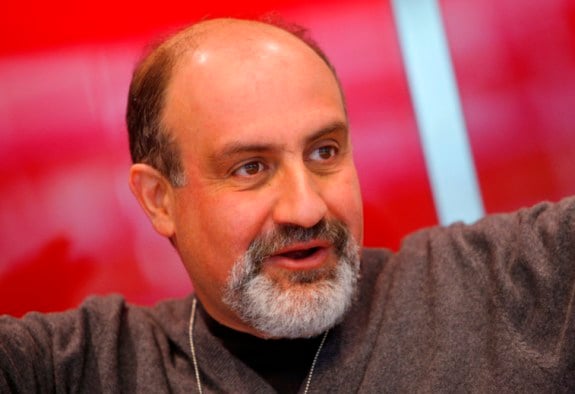The "Black Swan" author believes that the economy is still fragile and bruised, and now says that "the perception of hyperinflation is going to penalize real estate," and adds "it's going to penalize the stock market." So get used to more bumpy months like this one.
Events such as last week's stock market plunge that erased almost $1 trillion from U.S. equities usually have structural explanations, according to Nassim Nicholas Taleb, author of “The Black Swan.”
Nassim, adviser to Santa Monica, California-based Universa Investments LP, which the Wall Street Journal said may have helped trigger the decline with an options trade, said he had “no idea” what the hedge fund did on May 6. Focusing on specific trades may not yield an explanation, he said.
“When a bridge collapses, you don't look at the last truck that was on it, you look at the engineer,” Taleb said in an interview with Bloomberg Television today. “You're looking for the straw that broke the camel's back. Let's not worry about the straw, focus on the back.”
About $700 billion was erased in an eight-minute span during last week's selloff, which sent the Dow Jones Industrial Average down almost 1,000 points before losses were pared. The biggest U.S. trading venues submitted plans to federal officials this week for updated circuit breakers that would shut down markets during investor panics.
A $7.5 million trade in bearish options by Universa may have triggered selling that worsened the plunge, the Wall Street Journal reported. Calls to Universa President Mark Spitznagel seeking comment weren't immediately returned.
“I have absolutely no idea what Universa did, and I'm not connected, so I cannot provide an answer as the Nassim that is connected to Universa,” Taleb said.
Taleb, whose book “The Black Swan” is about how unforeseen events can roil markets, said that risks are greater now than before the financial crisis that led the U.S. economy to the worst contraction since the 1930s.
“The same fragility is still there,” he said. “I have detected fragility in the banking system and fragility in a lot of areas of economic activity. The risk has in fact increased. I'm extremely worried about government debt. The perception of hyperinflation is going to penalize real estate, it's going to penalize the stock market, penalize companies.
On May 10, Taleb told Bloomberg Radio that governments will only bring about an end to the credit crisis through the “blood, sweat and tears” of reducing public debt.
The U.S. posted its largest April budget deficit on record as receipts fell in a month that typically sees an increase in individual income tax payments. The excess of spending over revenue rose to $82.7 billion compared with a $20.9 billion gap in April 2009, Timothy F. Geithner's Treasury Department said yesterday. It was the second April deficit since 1983 and exceeded the median forecast in a Bloomberg News survey.
President Barack Obama's administration forecasts a $1.6 trillion budget deficit in the current fiscal year that began Oct. 1. Obama's debt commission met April 27, the first of a series of meetings aimed at producing a plan to cut the deficit.
“A year and a half after November 2008, the Obama administration doesn't still realize the magnitude of the problem,” Taleb said. “The problem was debt, and you don't cure debt with debt. I'm not very comfortable with Geithner out there. I'm not very comfortable with Larry Summers. And finally Bernanke was the one who crashed the plane. Bernanke called for great moderation when we had a rise of hidden risk. That trio is still there.”
Summers is the director of the White House National Economic Council, and Ben S. Bernanke became chairman of the Federal Reserve in 2006. Economists such as Bernanke called the easing of economic swings between the 1980s and the financial crisis that intensified in 2008 the “great moderation.”
Taleb praised plans by new U.K. Prime Minister David Cameron to cut a record budget deficit. The nation's government debt will rise to 77 percent of gross domestic product this year and may approach 100 percent by 2014, Standard & Poor's says.
“Cameron understands the problems,” Taleb said. “He knows what needs to be done. He understands the roots of the problems and knows how to get out of it.”
Taleb, a New York University professor, recommended caution with equities and Treasuries. The Standard & Poor's 500 Index posted an average decrease of 0.9 percent a year since 1999 through the end of 2009 including dividends, the first negative return for a decade since data began in 1927, according to S&P analyst Howard Silverblatt.
“Use the stock market for entertainment,” he said. “The stock market has disappointed people making retirement plans, thinking that it would appreciate over the last decade. If you have long-term treasury bonds, get out of it. A good collection of metals would work, or agricultural land.”







